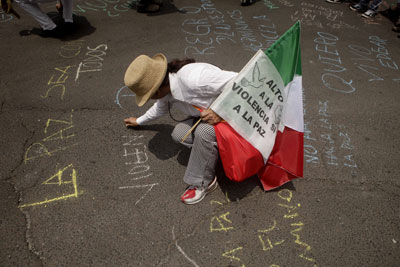The dissemination of reports and graphic photos of a dead man, reportedly decapitated and left in the border city of Nuevo Laredo with a warning that he was murdered for using a chat room, appears to be the latest attempt by organized crime to intimidate social media users and control the online agenda.
While it’s impossible to know the man’s identity, the reason for his death, or other details, the veracity of the reports and photos are nearly beside the point. In Mexico’s current climate, where CPJ research shows criminal organizations control the information agenda in many cities, what matters is the success of such attempts to scare professional and, increasingly, citizen journalists.
A state police spokesman who requested anonymity said the decapitated body of a man was left early Wednesday at a monument in downtown Nuevo Laredo, The Associated Press reported. A CPJ source, who spoke on condition of anonymity for fear of reprisal, confirmed through an eyewitness that a corpse was left at the scene.
Neither Nuevo Laredo police nor the Tamaulipas state prosecutor’s office has commented publicly on the case.
A report published Wednesday on a Nuevo Laredo news site showed a photo of a man’s body and severed head lying on the ground. The message on a banner near the body read: “This happened to me for not understanding that I shouldn’t report things on social networks,” the report said.
The same website reported that the message identified the dead individual by his nickname, “Rascatripas” (Belly Scratcher) and said he was a moderator on Nuevo Laredo en Vivo (Nuevo Laredo Live), an online forum used by Nuevo Laredo residents to denounce criminal gangs.
But on Thursday, a tweet on Nuevo Laredo en Vivo‘s account denied that the person found dead had any affiliation with that website. “Negative, the person executed was not a contributor with our site, but this was without a doubt an attempt to silence the voices of Nuevo Laredo,” the tweet said. The twitter account said that “he is confirmed to have been a scapegoat to scare others.”
The reports came a few weeks after the slaying of María Elizabeth Macías Castro, the first case CPJ has documented in which someone was murdered in direct retaliation for journalism posted on social media. The news editor of the local daily Primera Hora, Macías Castro, 39, also wrote about criminal groups and minor corruption or mismanagement in city affairs via Twitter and Nuevo Laredo en Vivo with the pseudonym “La NenaDLaredo” (The Girl from Laredo), journalists told CPJ. A note with her body, which was found at the same monument in the border town, said she had been killed for writing on social media sites and attributed the murder to a criminal group, news reports said.
In areas throughout Mexico where drug traffickers are warring with authorities, criminal groups have terrorized the press into not reporting on criminal activity. Some news organizations refuse to cover anything related to the drug trade, even if that means ignoring shootouts in the street. On many occasions, CPJ found, journalists are forced by cartels to publish stories attacking rival groups.
Citizens have tried to fill the void by sharing information on websites and social media like Facebook and Twitter, either anonymously or using pennames, CPJ research shows.
Reflecting this new reality, criminal groups have turned to targeting web and social media users in recent weeks. On September 13, the bodies of two unidentified young people were hung from a pedestrian overpass in Nuevo Laredo. Press accounts said notes left with the bodies warned against writing on websites. Macías’s body was found less than two weeks later.
